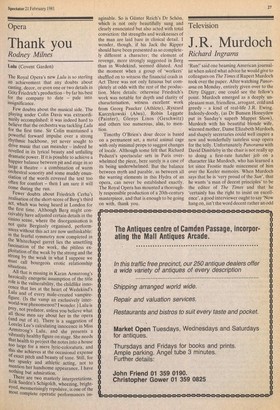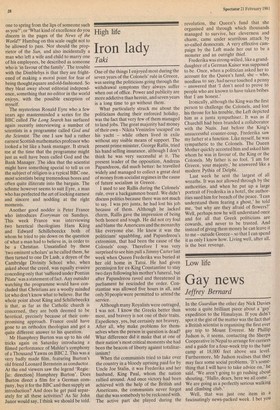Television
J.R. Murdoch
Richard Ingrains
'Run!' said one beaming American journalist when asked what advice he would give to colleagues on The Times if Rupert Murdoch took over the paper. After watching Panorama on Monday, entirely given over to the Dirty Digger, one could see the fellow's point. Murdoch emerged as a deeply unpleasant man, friendless, arrogant, cold and greedy — a kind of real-life J.R. Ewing. Indeedy-doody, (as Dr Bunsen Honeydew put in Sunday's superb Muppet Show), Murdoch with his beautiful blonde wife, wizened mother, Dame Elizabeth Murdoch, and shapely secretaries could well inspire a new and wonderfully tasteless soap opera for the telly. Unfortunately Panorama with David Dimbleby in the chair is not really up to doing a first-rate hatchet job on a character like Murdoch, who has learned a lot since Frostie made mincemeat of him over the Keeler memoirs. When Murdoch says that he is 'very proud of the Sun', that he wants 'a man of decent principles' to be the editor of The Times and that he 'certainly has the right to insist on excellence', a good interviewer ought to say 'Now hang on, isn't the word decent rather an odd one to spring from the lips of someone such as you?'; or 'What kind of excellence do you discern in the pages of the News of the World?' Humbug on this scale ought not to be allowed to pass. Nor should the prop rietor of the Sun, and also incidentally a man who left a wife and child to marry one of his employees, be described as someone who is 'in favour of the family'. The trouble with the Dimblebys is that they are frightened of making a moral point for fear of being thought 'square and old-fashioned. So they bleat away about editorial independence, something that no editor in the world enjoys, with the possible exception of myself.
The mysterious Ronald Eyre who a few years ago masterminded a series for the BBC called The Long Search has surfaced again recently interviewing a number of scientists in a programme called God and the Scientist. The one I saw had a rather earnest Scottish mathematics professor who looked a bit like a bank manager. It struck me at the time that the programme might just as well have been called God and the Bank Manager. The idea that the scientist might have something special to tell us on the subject of religion is a typical BBC one, most scientists being tremendous bores and often quite illiterate into the bargain. The scheme however seems to suit Eyre, a man who has perfected the art of looking earnest and sincere and nodding at the right moments.
Another good nodder is Peter France who introduces Everyman on Sundays. This week France was interviewing two heretical theologians Hans Kung and Edward Schillebeeckx both of whom he tried to pin down on the question of what a man had to believe in, in order to be a Christian. Unsatisfied by these 'two eminent scholars' as he called them, he then turned to one Dr Lash, a doyen of the Cambridge Divinity School who, when asked about the creed, was equally evasive conceding only that 'suffered under Pontius Pilate' was a statement of fact. Any outsider watching the programme would have concluded that Christians are a woolly minded lot who don't know what to believe. But the whole point about Kfing and Schillebeeckx is that, as far as the Catholic church is concerned, they are both deemed to be heretical, precisely because of their compromising approach. France could have gone to an orthodox theologian and got a quite different answer to his question.
Mr Humphrey Burton was up to his old tricks again on Saturday introducing a filmed performance of Mahler's symphony of a Thousand Yawns on BBC 2. This was a very badly made film, featuring Burton's old friend Leonard Bernstein as conductor. At the end viewers saw the legend 'Regie: [ie: direction] Humphrey Burton'. Does Burton direct a film for a German company, buy it for the BBC and then supply an introduction? And does he get paid separately for all these activities? As Sir John Junor would say, I think we should be told.







































 Previous page
Previous page